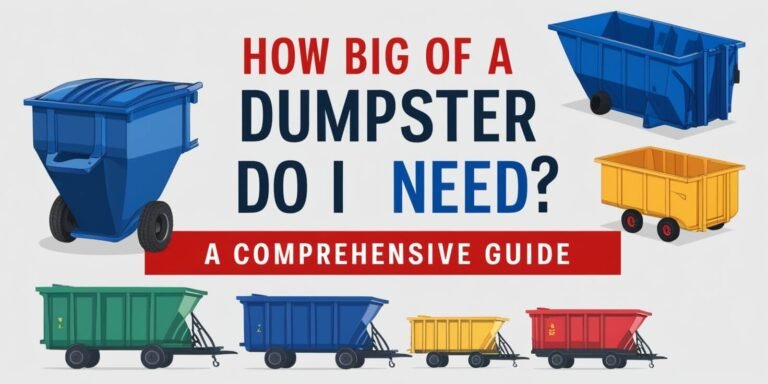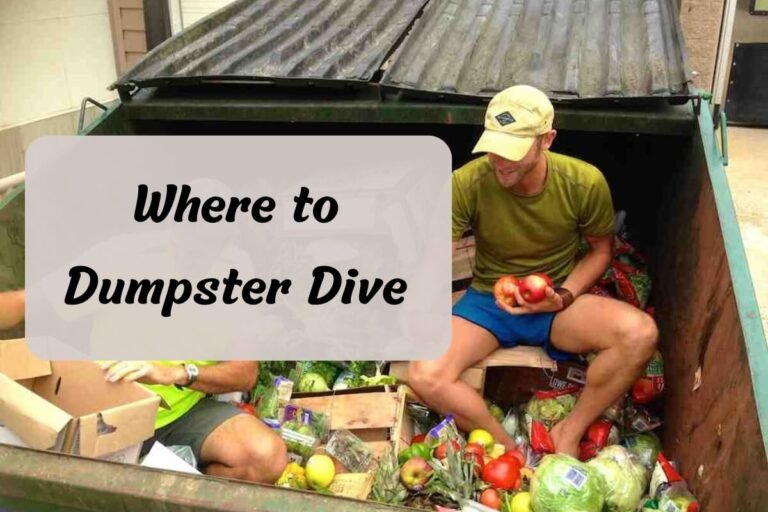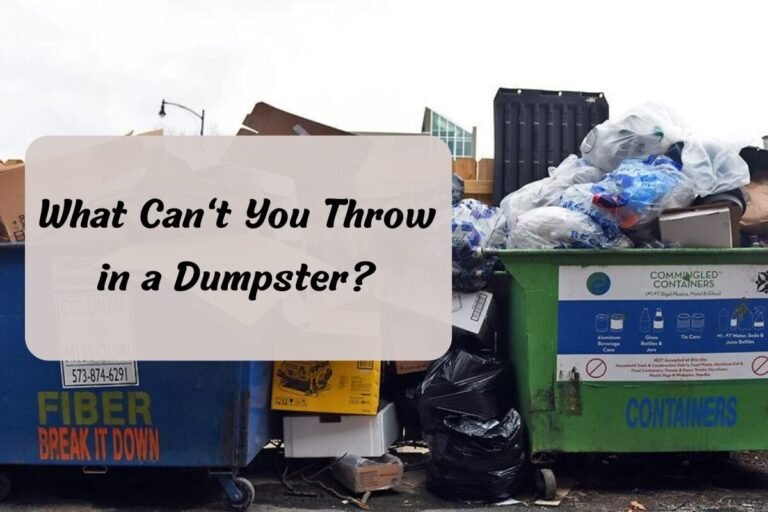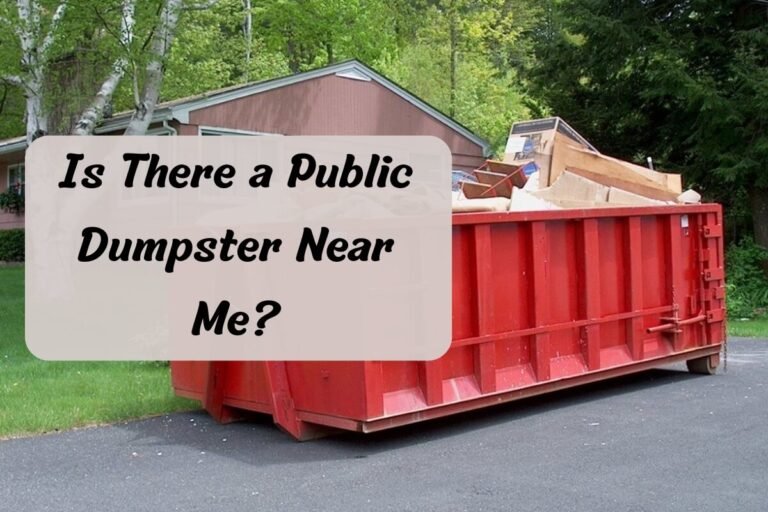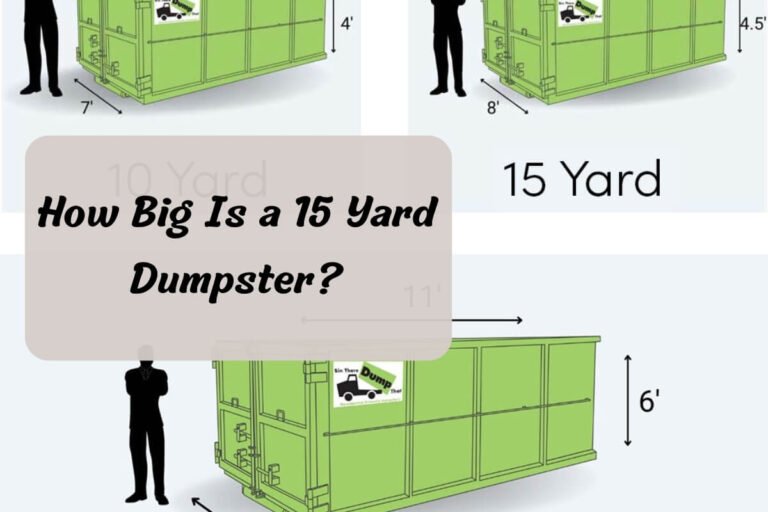How to Dumpster Dive: The Ultimate Guide to Dumpster Diving.

Are you looking to save money, reduce waste, or find hidden gems? Dumpster diving might be the solution you’ve been seeking. This guide covers everything you need to know about how to dumpster dive safely, legally, and successfully.
In this post, we’ll examine the world of dumpster diving, exploring topics such as:
- What dumpster diving is and who does it
- Legal considerations and potential risks
- Best places to find dumpster diving spots
- Types of treasures you can uncover while dumpster diving
- Essential gear and safety tips for dumpster divers
- Techniques for successful dumpster diving expeditions
- Dumpster diving specifically for food items
- Addressing common myths and misconceptions
So, let’s get started!
What is Dumpster Diving?
Dumpster diving, also known as skipping or bin-diving, is the practice of rummaging through commercial, residential, or public trash receptacles to find and salvage discarded items that still have value. These items could range from food, furniture, electronics, books, and clothing to scrap materials and even money or valuables.
Dumpster diving has become popular among frugal individuals, environmentalists, and those seeking sustainable living to reduce waste.
Who Dumpster Dives?
Dumpster diving appeals to a diverse range of people, including:
- Backpackers and budget travelers looking to stretch their finances
- Students and low-income individuals seeking free or low-cost resources
- Environmentalists and zero-waste advocates aiming to reduce waste and repurpose items
- Hobbyists and collectors searching for unique or valuable finds
- Entrepreneurs looking to acquire items to refurbish and resell
Many dumpster divers see it as a way to live more sustainably, minimize their environmental impact, and challenge the consumerist mindset of our society.
Is Dumpster Diving Legal?
The legality of dumpster diving can be a bit of a gray area, as laws and regulations vary widely depending on your location.
In most cases, dumpster diving is not considered theft, as items discarded in public trash receptacles are typically seen as abandoned property. However, there are some potential legal risks to be aware of:
- Trespassing: If a dumpster is located on private property, you could be charged with trespassing if caught accessing it without permission.
- Theft of Services: Some areas consider dumpster diving to be “theft of services” if the trash receptacle is owned by a private company or municipality.
- Loitering or Scavenging Laws: Certain cities or states have specific laws prohibiting loitering or scavenging in trash areas.
To stay on the right side of the law, it’s essential to research your local regulations and respect any posted “No Trespassing” signs or locked dumpsters.
Where to Dumpster Dive
Knowing where to look is key to successful dumpster diving. Here are some of the best places to find dumpster diving spots:
Grocery Stores and Supermarkets
These are goldmines for dumpster divers seeking food items. Grocery stores often discard perfectly edible (but past the sell-by date) produce, baked goods, canned items, and more.
Colleges and Universities
At the end of each semester or school year, students frequently discard furniture, appliances, electronics, and other household items as they move out of dorms or off-campus housing.
Retail Stores and Shopping Malls
Clothing stores, electronics retailers, and other shops may toss out unsold or slightly damaged merchandise, displays, and fixtures.
Neighborhoods and Residential Areas
Keep an eye out for dumpsters or piles of discarded items during neighborhood clean-outs or when people are moving.
Industrial Areas and Small Businesses
Warehouses, factories, and small businesses may discard overstock, excess materials, or unwanted equipment.
Additionally, you can check online forums, local Facebook groups, or dumpster diving communities for tips on the best spots in your area.
What Can You Find While Dumpster Diving?
The range of items you might uncover while dumpster diving is truly astounding. Some common finds include:
- Food: Fruits, vegetables, baked goods, canned/packaged items, and more
- Furniture: Couches, chairs, tables, dressers, and other household furniture
- Appliances and Electronics: TVs, computers, printers, speakers, and other devices
- Books and Media: Books, magazines, CDs, DVDs, and video games
- Clothing and Accessories: Apparel, shoes, bags, and jewelry
- Home Decor and Crafting Supplies: Vases, picture frames, art supplies, fabric, and more
- Building Materials: Lumber, hardware, tools, and construction materials
Some dumpster divers have even stumbled upon truly incredible finds, such as:
- Valuable Antiques and Collectibles
- Rare Books and Artwork
- Precious Metals and Jewelry
- Cash and Gift Cards
Patient and persistent dumpster divers may find rare treasures.
How to Dumpster Dive Safely and Responsibly
Dumpster diving can be a rewarding experience, but it’s essential to approach it with caution and respect. Here are some tips for safe and responsible dumpster diving:
Preparing Mentally and Physically
- Be prepared for the possibility of unpleasant sights, smells, and encounters with pests or hazardous materials.
- Dress appropriately in long pants, closed-toe shoes, and protective clothing you don’t mind getting dirty.
Essential Dumpster Diving Gear
- Thick work gloves to protect your hands from sharp objects or contaminants
- A headlamp or flashlight to illuminate dark dumpster interiors
- A sturdy stick or pole to move items around and avoid direct contact
- Plastic bags or containers to store your finds
- Hand sanitizer or disinfecting wipes for cleaning up after diving
Safety Precautions
- Watch out for sharp objects, broken glass, needles, or other hazards that could cause injury.
- Be aware of potential pests like rodents or insects that may inhabit dumpsters.
- Avoid entering compactor dumpsters or receptacles with heavy, moving parts.
- Never consume food or beverages found in dumpsters without properly inspecting and cleaning them first.
Dumpster Diving Etiquette
- Respect private property and stay away from locked or clearly marked dumpsters.
- Don’t leave a mess behind; leave the area as clean (or cleaner) than you found it.
- Be discreet and avoid drawing attention to yourself unnecessarily.
- Share your finds and knowledge with others in the dumpster diving community.
Follow these guidelines for a safe and rewarding dumpster diving experience.
Tips for Successful Dumpster Diving
While dumpster diving can be a bit of an adventure, having the right knowledge and techniques can significantly improve your chances of success. Here are some tips from experienced dumpster divers:
Best Times to Go Dumpster Diving
- Early mornings, right after sunrise, when businesses are discarding day-old or expired items
- Late evenings, after stores have closed for the day
- Weekends, when residential areas may have more household discards
Techniques for Finding and Retrieving Items
- Use a flashlight or headlamp to illuminate the dumpster’s interior and spot potential finds.
- Gently move aside bags or debris with a long pole or stick to reveal items underneath.
- Check around the dumpster area, as valuable items are sometimes left nearby.
- Be patient and take your time to thoroughly inspect each dumpster.
Sorting and Cleaning Your Dumpster Dive Finds
- Separate your finds into categories (food, clothing, electronics, etc.) for easier organization.
- Discard any items that are visibly damaged, contaminated, or pose a health risk.
- Clean and disinfect salvageable items using appropriate methods (washing, wiping down, etc.).
- Properly store and refrigerate any perishable food items immediately.
Remember, dumpster diving is a numbers game. The more dumpsters you explore, the higher your chances of stumbling upon valuable or interesting items. Don’t get discouraged if your first few attempts yield little; patience and persistence are key.
Dumpster Diving for Food
For many dumpster divers, the primary motivation is to acquire free, perfectly edible food that would otherwise go to waste. Here are some tips for dumpster diving specifically for food:
Where to Look for Food
- Grocery stores and supermarkets are the best sources for discarded produce, baked goods, canned items, and more.
- Bakeries, cafes, and restaurants may discard unsold prepared foods, pastries, and other perishable items.
- Check dumpsters behind food processing plants, distributors, or wholesalers.
Types of Food to Look For (and Avoid)
- Canned and packaged goods that are still sealed and undamaged are generally safe to consume.
- Fresh produce with minor blemishes or bruising can be salvaged and consumed immediately.
- Avoid any open, leaking, or contaminated food items, as well as anything that shows signs of spoilage or mold growth.
- Be cautious with perishable items like meat, dairy, and prepared foods, as these can harbor harmful bacteria if not properly refrigerated.
Handling and Storing Dumpster-Dived Food
- Inspect all food items thoroughly before consuming, and discard anything that raises health concerns.
- Wash all produce thoroughly with clean water and a produce wash or mild soap.
- Cook or consume perishable items immediately, or freeze them for later use.
- Properly store and refrigerate items to maintain freshness and safety.
By following these guidelines, you can safely and responsibly salvage perfectly good food that would otherwise end up in landfills.
Dumpster Diving Myths and Misconceptions
Despite its growing popularity, dumpster diving is still often misunderstood or stigmatized. Here, we’ll address some common myths and misconceptions:
Dumpster Diving is Illegal
As discussed earlier, dumpster diving is generally legal in most areas, as long as you respect private property boundaries and local regulations.
Everything in Dumpsters is Contaminated or Unsafe
While it’s true that dumpsters can contain hazardous or unsanitary items, many discarded goods are perfectly safe for salvage and reuse with proper precautions.
Dumpster Diving is Only for the Desperate or Homeless
In reality, dumpster divers come from all walks of life, united by a desire to reduce waste, save money, or find unique items.
Dumpster Diving is Unsanitary or Gross
With the right gear, techniques, and mindset, dumpster diving can be a clean and rewarding experience for those willing to get their hands dirty (metaphorically speaking).
There’s Nothing Worth Finding in Dumpsters
As countless dumpster diving stories and hauls demonstrate, valuable, unique, and perfectly usable items end up in dumpsters every day – you just have to know where to look.
By debunking these myths, we hope to encourage more people to approach dumpster diving with an open mind and a willingness to explore its potential benefits.
Wrapping UP
Dumpster diving is more than just a frugal activity or hobby – it’s a way to reduce waste, live more sustainably, and potentially uncover hidden treasures. With the right knowledge, preparation, and mindset, anyone can learn how to dumpster dive safely, legally, and successfully.
Remember to always prioritize safety, respect private property boundaries, and leave dumpster areas as clean (or cleaner) than you found them. Who knows what valuable or unique items you might stumble upon on your next dumpster diving adventure?
So, what are you waiting for? Grab your gloves, flashlight, and reusable bags, and start exploring the world of dumpster diving today! Happy hunting!

